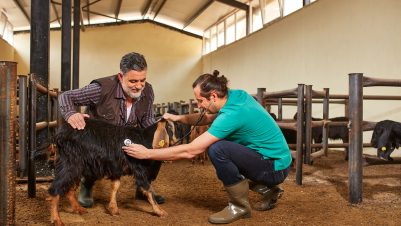There is a game on Radio 4’s Just a Minute called “One tune to the tune of another”. Contestants have to sing the words of a song to the tune of a different one in a totally different style. This year I have been mainly singing the song of “trying to run and work in a veterinary practice” to the tune of a global pandemic. As I’m writing this article, we are well into the start of the second wave. I am fortunate to live in an area that has been less affected by it than many others (I am in the South West), but now the coloured map of cases is steadily going blue all around us. I have avoided writing about COVID and vets up to now, but there really isn’t much else I can dredge up from the old grey matter. If you are in search of lighter relief, I suggest you find a copy of last month’s magazine and my review of the new James Herriot TV series.
As vets with some understanding of viruses and epidemiology, the current situation is not too surprising, and not really a second wave, just a continuation of the first which had a brief post-lockdown dip. At least we had a few weeks of relative normality in the summer, and that of course was the problem: that brief summer holiday from the desperate times in the spring, when the graphs were all finally going in the right direction, was when the virus spread.
One of the many causes of stress in this situation is loss of control. Control over your own life and work is important to good mental health. If you work somewhere where you have no control over your day’s work then that is a chronic cause of stress. The population of developed countries is used to being in full control of their lives. What time to get up, what job to do, how to spend leisure time, who you see and who you avoid. To a large extent, for many people health and wellness has been within our control as well. Suddenly, an entire country was deprived (in lockdown) of its self-determination and control. Working vets suddenly had to work in a completely new way – the infamous kerbside-consult was born. For a long period, only emergency work was being done. When the national lockdown was announced, there were a few days between it starting and the furlough scheme being revealed. Like many business owners, veterinary and otherwise, I could not see a way through. We had been told to stop most of our business but had still full overheads and staff wages. It could not work. The day the furlough scheme was announced was a shining light in a very dark tunnel – of which there is still no sign of the end.
As we emerged from lockdown, some of the worst predictions had not quite come to pass. Vets had not had to work in human respiratory wards, we had managed to keep our supplies of oxygen, propofol and most other drugs. PPE was hard to come by but had to be worn (and still is) both when working with the public and team members. Many vet practices split into teams when possible. The fear from contact tracing taking out a whole practice was very much in people’s minds. The BVA achieved a huge bit of progress in making team members exempt from contact tracing if we wore PPE and followed COVID-safe practices. The furlough scheme ran through the whole summer and into autumn, and stories started to come through of limited numbers of staff being run ragged whilst half the practice (or more) remained furloughed. I could not see the logic in this. If the demand for service is there then staff the practice properly. We had a very busy catch-up period over summer but we were back to full staff on 1 July. Whilst the furlough cheque was nice it was not meant to enable working half your staff twice as hard as usual.
The next stage we will have to face is unclear. National lockdowns have shown to provide some temporary relief but leave you with an immunologically naive population, back to square one. We do not have the population control to eradicate the virus, and we have missed the window of opportunity New Zealand had to achieve virus-free status. The best we can hope for is that the various local lockdowns keep the hospital admissions low enough to cope with, while the schoolchildren and university students set about the task of building up some herd immunity. As I heard one student say on the radio “I didn’t expect to pay nine grand a year to be confined to my room and do online lectures”. For our practice, we will keep on doing our blend of car-park and in-building consults with our “drive-in waiting room” and outdoor dispensary system that seems to work well. Good luck to all of you.










